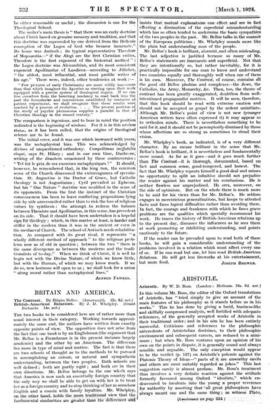BRITAIN AND AMERICA.
THE two books to be considered here are of rather more than usual interest in their category. Working towards approxi- mately the same end, the authors have written from exactly opposite points of view. The opposition does not arise from the fact that one book is by an Englishman (the argument that Mr. Belloc is a Frenchman is in the present instance largely academic) and the other by an American. The difference lies more in type of mind and motive. The fact is that there are two schools of thought as to the methods to be pursued in accomplishing an entente, or natural and sympathetic understanding, between the two peoples. Both schools are well defined ; both are partly right ; and both err in their own directions. Mr. Belloc belongs to the one which says that America is now such an essentially foreign country that the only way we shall be able to get .on with her is to treat her as a foreign country and to stop thinking of her as somehow English and a cousin with family loyalties. Mr. Whelpley, on_the other hand, holds the more traditional view that the funiiainental similarities are greaTeilhailhe -dilfereikerail insists that mutual explanations can' effect- and are in fact effecting a diminution of the superficial misunderstanding
which has so often tended to undermine the basic sympathies of the two peoples in the past. " Mr. I3elloc talks in the manner of the European politician ; Mr. Whelpley sounds more like the plain but understanding man of the people. .
Mr. Belloc's book is brilliant, alarmist, and often misleading. The last adjective is justified because so many of Mr.
Belloc's statements are inaccurate and superficial. Not that they are intentionally so, but rather inevitably, for it is practically impossible for one man to know and understand
two countries equally and thoroughly well when one of them is his own. Moreover, The Contrast, of course, contains all the good old Belloc phobias and complexes—the Jews, the Catholics, the Army, Monarchy, &c. Then, too, the theme of contrast has been greatly exaggerated, doubtless from well--
intentioned propagandist motives. It will be seen, therefore, that this book should be read with extreme caution and should not be accepted as gospel by the ardent uninitiate.
Although Mr. Belloc's point of view is not new (younger American writers have often expressed it) it may appear so to orthodox minds. There is nevertheless something to be said for it. and it should not be peremptorily dismissed by those whose affections are so strong as sometimes to cloud their vision.
Mr. Wheipley's book, as indicated, is of a very different character. By no means brilliant in the sense that Mr.
Belloc's book is brilliant, it is nevertheless and fundamentally
more sound. As far as it goes—and it goes much further than The Contrast—it is thorough, documented,. based on
fact and common sense, good-tempered, and honest. The fact that Mr. Whelpley repeats himself a good-deal and misses no opportunity to split an infinitive should not prejudice the reader against his matter and his conclusions. He is neither flawless nor unprejudiced. He errs, moreover, on the side of optimism. But on the whole there is much more to be said for his views than for Mr. Belloc's. He seldom engages in meretricious generalizations, but keeps to attested facts and faces logical difficulties rather than avoiding them.
In fact, the courage and frankness with which he faces grave problems are the qualities which specially recommend his work. He traces the history of British-American relations up to the present day, discusses the influences as he sees them at work promoting or inhibiting understanding, and points cautiously to the future.
If the reader can be prevailed upon to read both of these books, he will gain a considerable understanding of the
problems involved in a relation which must affect every one of us. If he can read but one, let him read British-American Relations. He will get less fireworks at his entertainment,










































 Previous page
Previous page